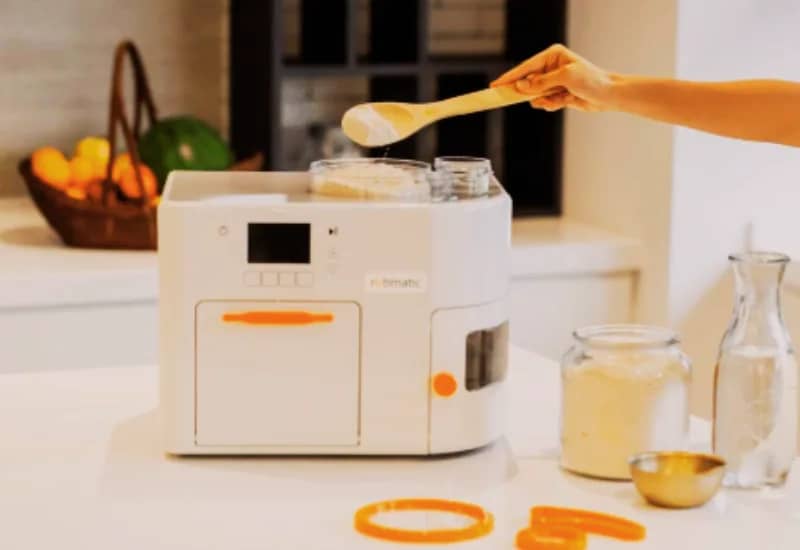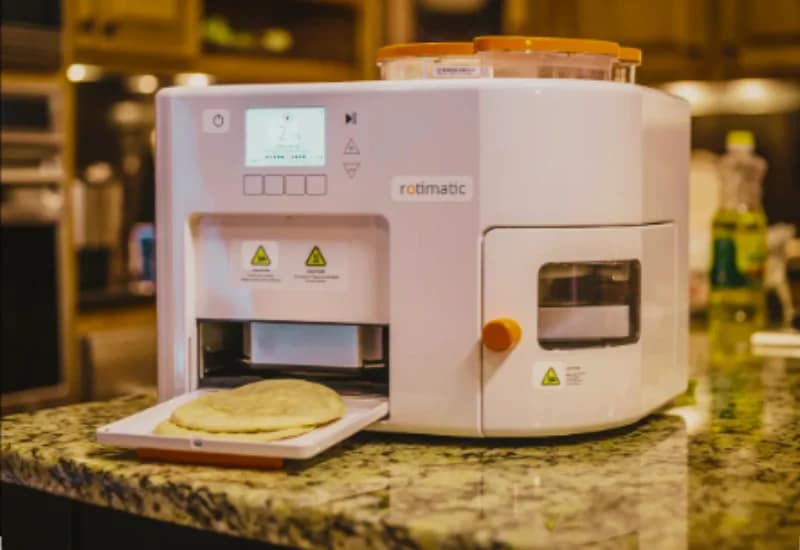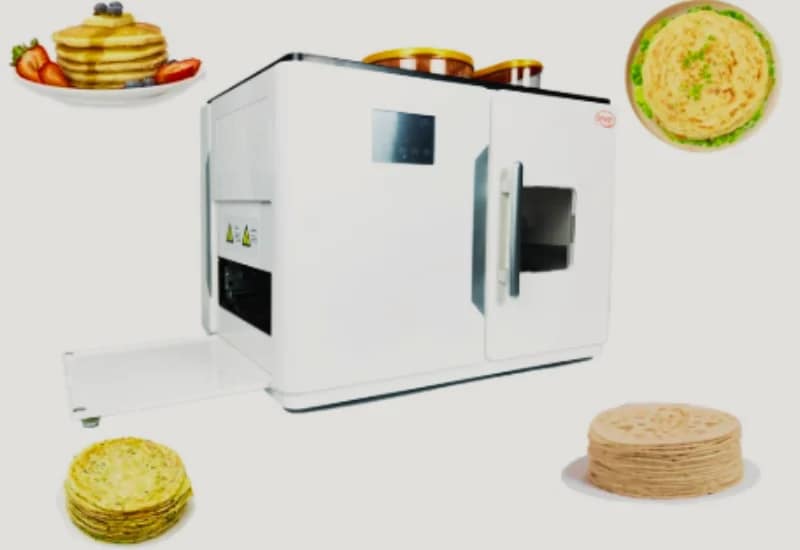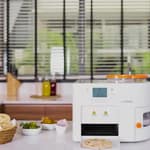Introduction
Flatbread is a daily staple in many cultures and use in every home, whether it is Pakistani roti, Middle Eastern pita, or Mexican tortillas. Every day, making them by hand can be hard and time-consuming and also a physically demanding. But what if a smart machine can do it all for you?
Meet Rotimatic, the world’s first fully automated kitchen machine designed to prepare flatbreads with the single press of a button. By pressing the dough and cooking, Rotimatic delivers a fresh, hot flatbread in about 90 seconds.
Since its introduction, Rotimatic has gained popularity in more than 20 countries, including the USA, UK, Canada, Australia, Singapore, India, Pakistan, and the UAE. Developed by a Singapore-based tech couple, the product has revolutionized modern kitchens with its AI-powered features, cloud-based updates, and real-time app connectivity.
In this blog post, I will explain how Rotimatic works, why it is best and trending worldwide, its pros and cons, user feedback, and whether it is worth the investment in 2025.
What Is Rotimatic & Why It Matters?
Rotimatic is a top kitchen appliance that automates the process of making fresh rotis (Pakistani flatbreads). Users only need to fill the compartments with flour, water, and oil. Then, by selecting options on the touchscreen or mobile app, Rotimatic prepares and dispenses perfectly round and cooked rotis in minutes.

Key Features:
- The adjustment of flour-to-water ratio in real time is through AI-powered intelligence.
- Wi-Fi connectivity for firmware and recipe updates.
- It has a touchscreen interface and app control.
- Multi-flatbread support like Rotis, puris, tortillas, pizza bases, and more.
- Automatic cleaning reminders for better hygiene and performance.
What makes Rotimatic significant is how it merges traditional cooking with futuristic convenience. It is best for working parents, elderly users, or busy individuals, Rotimatic saves time, energy, and ensures a consistent quality of food.
How Rotimatic Works?
Rotimatic uses a six-stage process, powered by smart sensors and internal software:
Warm-Up
Turning the appliance on, the device takes around 5 minutes to heat the internal plates to the right temperature.
Load Ingredients
Flour, oil, and water are put into separate containers. The machine has stored these ingredients for multiple uses.
Choose Your Settings
You can also customize roti thickness, roast level, and oil quantity from the touchscreen or app.
Mixing and Kneading
Rotimatic automatically calculates how much water and oil are needed based on your flour quantity and makes a dough ball.
Pressing and Cooking
The dough ball is flattened into a round disc and cooked between two heated plates using precision timing and pressure.
Dispensing
Within 90 seconds, a hot, fresh roti slides out from the front tray, ready to eat.
This cycle repeats automatically until the selected number of rotis is completed.
Tech Specs
| Feature | Details |
| Size | 28 x 37 x 46 cm |
| Weight | 20 kg |
| Power Consumption | 1.6–1.8 kW |
| Noise Level | Improved in “Rotimatic Plus” version |
| Connectivity | Wi-Fi + App Integration |
Rotimatic’s Global Reach and Evolution
Rotimatic was first time introduced in 2008, and after years of testing, it launched globally in 2016. Since then, it has shipped to over 20 countries, including major markets like the United States, the United Kingdom, Australia, India, Pakistan, and the UAE.
Product Timeline:
- 2016 – Initial global release.
- 2018 – Hardware upgrades for improved flour dispensing.
- 2023 – Launch of Rotimatic Plus: quieter and faster.
- 2025 – Introduction of Rotimatic Next, with improved AI and smaller form factor.
Each new version, software updates are delivered over the cloud, increasing the machine’s performance and adding new recipes like multigrain roti, pizza base, and even gluten-free options.

Advantages of Using Rotimatic
Time-Saving
No more kneading dough or rolling rotis, just press a button and go. Each roti takes around 90 seconds after warm-up.
Consistency
AI sensors ensure uniform size, thickness, and roast level.
Multi-functional
Supports different types of flours and recipes—ideal for families who like variety.
Smart Connectivity
Get new recipes, fix bugs, and improve performance via automatic software updates.
User-Friendly
Touchscreen controls and a connected app make setup and cooking incredibly easy, even for beginners.
Disadvantages of Rotimatic
High Price
The price range of Rotimatic is between $1,749–1,949; it is a luxury item and may not fit every budget. You can purchase the Rotimatic Machine and get 5% discount from Amazon.
Taste
The taste and texture may not always match handmade rotis, especially if you prefer soft or flaky varieties.
Maintenance
Regular cleaning is necessary. If it is not maintained properly, the machine may clog or produce poor results.
Heavy and Bulky
It takes up significant counter space and is not easily movable due to its weight (~20 kg).
Repair Costs
In some regions, replacement parts or servicing can be slow and expensive.

User Review About Rotimatic Machine
Rotimatic reviews are a mix of praise and honest critique. Here are some real-life sentiments:
“I use it every day. It’s a lifesaver when I’m juggling kids and work. Rotis are decent, not like my mom’s, but definitely worth it for the convenience.” USA User
“It broke after 8 months. Customer service helped, but repair took time. Still, I love the idea and will upgrade to the next model.” Indian User
“I live alone. I couldn’t be happier. I hated making rotis by hand, and now I just load it and forget it. Works great with almond and gluten-free flour too.” Canadian User
Is Rotimatic Worth Buying in 2025?
That depends on your personal needs and lifestyle.
Buy it if:
- You eat flatbreads regularly.
- You have a busy lifestyle or limited time to cook.
- You want convenience and are comfortable with technology.
Avoid it if:
- You prefer the taste and feel of handmade rotis.
- You rarely eat flatbreads.
- You’re on a tight budget.
Bottom Line:
Rotimatic is not for everyone but if you value convenience, automation, and smart technology in your kitchen, it can be a powerful addition. Think of it as a time-saving tool like a dishwasher or washing machine an investment in daily comfort.
Future of Flatbread Making
Rotimatic has opened the door to a new kind of kitchen one that blends traditional meals with modern automation.
In the future, we may see versions that:
- Support even more flatbreads (naan, pita, lavash),
- Include voice assistant integration (like Alexa or Google Assistant),
- Use less energy and space,
- Have dishwasher-safe parts,
- Or even offer flavor infusions and spice blends.
This smart kitchen robot is likely the first of many innovations that will bring AI and automation into our daily cooking routines.
Conclusion
Rotimatic is not just a kitchen tool, it is a symbol of how cooking is evolving. It blends age-old food traditions with AI, connectivity, and engineering to bring you warm, fresh flatbreads anytime you want them.
It is an investment but for those who rely on rotis or tortillas as part of their regular meals, it’s a game changer. The convenience, consistency, and smart capabilities make it stand out in today’s smart kitchen landscape.
Whether you’re a tech lover, a busy parent, or someone who simply hates rolling rotis every day, Rotimatic might just be the future you didn’t know you needed.
Call to Action
Are you ready to automate your rotis? Or do you have doubts about the taste and reliability? Share your thoughts below in the comments.

1 thought on “Rotimatic Machine 2025 |The Global Kitchen Robot Changing Flatbread Forever”